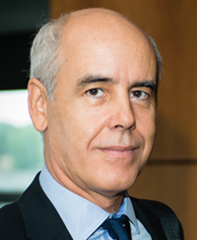Climate adaptation: Humberto Delgado Rosa interview
 The European Commission’s Humberto Delgado Rosa talks to Stephen Dineen about the need to adapt to climate change now and the economic benefits of adaptation.
The European Commission’s Humberto Delgado Rosa talks to Stephen Dineen about the need to adapt to climate change now and the economic benefits of adaptation.
Irrespective of the difficulties in securing a global response to mitigating climate change, Humberto Delgado Rosa understands from six years as Portuguese Environment Minister (2005-2011) how hard it is to even get economies to consider adapting to its likely effects.
Yet as DG Climate Action’s Director of Mainstreaming Adaptation and Low Carbon Technology, Delgado Rosa’s task is to co-ordinate EU adaptation and to encourage national governments to take action. The case for adapting is compelling, he believes. Extreme weather events are “everywhere” he tells eolas. “They are starting to get routine, almost as if normal, extreme droughts a bit everywhere, enormous floods, heatwaves; look to the US this summer.”
Ireland has not been, nor will it be, immune. He cites the EPA’s 2011 report on climate change. Between 1890 and 2004, the mean annual temperature rose by 0.7°C, expected to increase by a further 1.8 to 4°C by 2100. The frost season has shortened. Sea levels will rise between 18 and 59cm this century. Vulnerable species requiring cooler conditions may become extinct. Extreme weather events such as intense storms and rainfall will become more frequent.
The north west of Europe, more generally, should see an increase in winter rain and river flow. Freshwater species will move northward and the risk of coastal flooding will increase.
Delgado Rosa and DG Climate Action are finalising an EU adaptation strategy. Currently undergoing an impact assessment, it is due to be published next March.
“Adaptation is very broad, it touches many sectors,” he states, “so we don’t mean to do a Bible of adaptation at EU level but to have some of the main policy options that Europe indeed should follow in several sectors, with several policy instruments.”
The strategy will attempt to mainstream adaptation in EU policies and is likely to include public-private partnerships, guidelines and standards. It will address cross-sectoral policy areas such as dealing with the social dimensions of adaptation (e.g. inward migration to Europe). Adaptation will not stop at national boundaries and the new policy will aim to facilitate co-operation between member states on trans-boundary risks.
This plan will follow on from the European Environment Agency’s Climate-Adapt, an online platform about adaptation. Its database includes tools for adaptation support, case study searches and an overview of countries’ activities.
Member states are already producing national adaptation strategies. Twelve EU countries have plans but Ireland is still developing one. Countries “should aim to have proper assessments of risk,” he states on a strategy’s starting point. While there are many studies assessing risk, “assessment is not equivalent in all sectors,” he cautions, and only after comprehensive assessment can a country begin to build a strategy.
Progress in both preparing for climate change and actually adapting across the union is varied, with some countries at “the very early stages of paying attention to it”. Front runners like the UK, he notes, are producing action plans “which can be very specific, very well developed”.
“This is where the European Union can help,” states Delgado Rosa. “We bring in the knowledge, the best practices, we show where are the front runners, what have they done good, what they have done not so good.”
When asked if governments’ strategies should include binding actions on sectors, Delgado Rosa says that this is a matter for member states. Mandatory actions are rarely necessary, he believes, as “much of what has to be done in adaptation is not something radically new that upsets sectoral policy.” Pre-adaptation measures often exist. “You just need to reinforce them, reshape them or prepare them for an even harsher climate, so usually these sectors can like this approach.”
While costs are involved in adaptation, Delgado Rosa points out that studies show the long-term financial benefits. “For instance, if we invest in getting proper flood protection, being ready for [the] next drought, knowing how to avoid forest fires or to fight them,” he explains, “this costs money, but then you have the pay-off of reduced costs.”
The EU-funded ClimateCost Project’s report in September 2011 predicted net savings through coastal adaptation of €1.5 billion to €7.3 billion a year for the EU in the 2020s, rising to €18.4 billion to €47 billion in the 2080s.
Economic opportunities will also exist as “solutions for adaptation will have worldwide acceptance and need.” He says that businesses that can “innovate in proper services, technology, that will help adapt, mainly in cities as many people will live in cities in the future, are likely to get some first movers’ advantage.”
An example is energy efficiency in buildings. As well as reducing greenhouse gas emissions, “it goes hand in hand with insulation and with preparing the cities to resist, for instance, heat waves or cold waves or intense winters.” Citizens save money whilst helping homes, cities and regions to adapt. “It can bring jobs that stay in Europe and they don’t go away.”
 No silver bullet on mitigation
No silver bullet on mitigation
When Portugal held the Presidency of the European Council in 2007, Delgado Rosa was EU lead negotiator during international climate talks in Bali. “Well, we are not naïve, and we know that it’s hard to get an international climate agreement,” he says of recent progress. While the Durban 2011 outcome, a pledge to reach an agreement by 2015 that will be binding on all countries, is “very good news,” the road ahead will be bumpy.
However, he believes that recent extreme weather events and public opinion’s pressure on governments may help governments to secure the necessary agreement by 2015. Progress in mitigating climate change will not involve “a silver bullet or an enormous breakthrough” but “if you look back in time to international climate negotiations, there’s a positive trend irrespective of the difficulties.”
Distinctions between industrialised, developed and developing countries in the Kyoto Protocol (Annex I, Annex II and Non-Annex I countries) are “a picture of a world quite some decades ago”. For some countries, “it’s very hard … to move because other interests that go beyond climate action appear.”
Is he hopeful? “I’m hopeful, not naïve. It will be difficult.”





